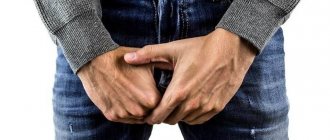Almost every woman has probably experienced itching in the intimate area. Clinical manifestations of symptoms include inflammation of the vulva and vagina, often accompanied by discharge from the genital tract. This often leads to serious discomfort, disrupts the natural flow of life, and undermines self-confidence.
From a medical point of view, the appearance of vaginal itching can be associated with various factors: from improper care of the intimate area to serious diseases. In this article we will look at this problem in detail, understand the causes of its occurrence, methods of its treatment and prevention.
Reason number 1 – thrush!
Most often, itching after sexual intercourse is caused by thrush (candidiasis). The disease is a fungal infection that appears when there is a pathological increase in opportunistic fungi of the genus Candida. These microorganisms are present in the biocenosis of the body of every healthy person, however, they actively reproduce and exhibit their pathogenic effect during the period of a general decrease in immunity, with problems with hormonal levels, after taking antibiotics. A characteristic feature of thrush is frequent relapses (up to several times a year).
Actively multiplying on the surface of the vaginal mucosa, microorganisms cause inflammation. Sexual intercourse provokes irritation of the inflamed mucous membrane and leads to more acute pain, itching or burning in the vagina.
Why does a burning sensation occur in the vagina?
How to identify thrush? There are several sure signs of candidiasis that a woman who notices itching after intimacy with a sexual partner can identify:
- curdled discharge with a sour odor, which may become more abundant after sexual intercourse;
- frequent itching in the vaginal area, which can be provoked not only by sex, but also by ordinary hygiene products;
- Possible pain during sexual intercourse or urination.
To treat thrush and eliminate itching after sexual intercourse, you should consult a doctor. Today there are many highly effective antifungal drugs that act locally. The course of treatment, as a rule, does not exceed 10-14 days. However, to prevent relapse, a course of treatment should be prescribed to both sexual partners, and after completion of treatment, a course of restorative therapy is recommended.
Features of examination in the presence of vaginal itching
What to do if there is itching in the vagina? First, determine its cause.
For this purpose, a comprehensive examination is used to identify not only infectious pathogens, but also other provoking factors.
The examination plan necessarily includes ELISA and PCR tests, which make it possible to accurately determine the pathogenic microorganism.
The standard diagnostic mechanism includes:
- blood and urine tests;
- advanced biochemistry to determine the activity of the inflammatory process and the involvement of other organs and systems;
- PCR for STDs;
- ELISA and PCR for herpes, other specific pathogens in agreement with the attending physician;
- scrapings from the anus or skin folds;
- urine culture for flora;
- standard genital tract smear, as well as PCR testing;
- Ultrasound of the pelvis.
When identifying microorganisms and diagnosing infectious inflammation of the vulva, control tests after treatment must be examined.
This ensures the prevention of relapses and guarantees the destruction of the pathogen.
If a woman has vaginal itching due to allergies, then a search for the irritating antigen is carried out using skin testing.
One test, even the best one, to identify the causes of vaginal itching will not help to accurately identify the problem.
A comprehensive examination is required.
Where to go for diagnostics?
You should choose a medical institution that has sufficient diagnostic potential and qualified personnel.
Since most often the problem is associated with sexually transmitted diseases, a dermatovenerological dispensary is best suited.
Here you can also learn how to prepare for specific tests.
If we talk about which doctor treats and examines patients, then it is preferable to choose a dermatovenerologist or gynecologist.
Reason number 2 – infections
Other infections that can cause itching after sex are trichomoniasis and bacterial vaginosis. In the first case, a woman may notice a greenish discharge, the appearance of which is accompanied by an unpleasant putrefactive odor. If such a symptom occurs, you should not delay contacting a specialist who will prescribe effective treatment.
Itching after intercourse
Bacterial vaginosis is a disruption of the normal microflora that populates the vaginal mucosa. As a rule, tests show an increased number of gardnerella and a decrease in the volume of beneficial lactobacilli.
Both cases are a direct indication for an in-person consultation with a gynecologist.
Expert opinion
Both women and men must undergo the examination. It is extremely important to do this even if the intimate partner does not complain of unusual discharge from the urethra or rash on the penis. This is due to the fact that the manifestations of some STDs in men are less pronounced than in women.
Obstetrician-gynecologist of the highest category Oksana Anatolyevna Gartleb
How to treat vaginal itching
The question of how to get rid of vaginal itching arises acutely immediately after the appearance of an unpleasant symptom.
An attempt to use traditional methods of influencing the problem only worsens the clinical picture.
Therefore, the only correct way to quickly relieve vaginal itching is to consult a specialist for medical help.
The general principles of therapeutic action on a painful condition include the following steps:
- establishing the cause of the disease;
- external treatment - apply ointment or gel for vaginal itching;
- antihistamine antiallergic drugs locally or systemically;
- restorative therapy;
- systemic antimicrobial therapy - tablets or injections for vaginal itching;
- anti-relapse treatment.
Only a medical specialist can decide how to relieve vaginal itching based on diagnostic results or at least a preliminary examination.
However, before you begin medicinal correction of the problem, you need to start with hygiene issues.
Plays an important role as a wash when itching in the vagina.
Highly alkaline soap solutions only irritate the mucous membrane, so neutral agents are always preferable.
If there is a rash on the skin of the pubis and itching in the vagina, then it is necessary to exclude the presence of lice.
When lice are detected, all that is required is shaving, douching with antiseptic solutions and anti-pediculosis treatment.
Pubic lice are removed quite easily and quickly, and the problem of unpleasant sensations disappears.
If there are pimples and itching in the vagina, then the likely cause is herpes.
In this case, antiviral therapy is used.
The drugs of choice are acyclovir and its derivatives.
An ointment for vaginal itching containing this drug is prescribed for up to 1 month.
In parallel, acyclovir or valacyclovir is taken orally.
Reason number 3 – allergies
Women who are prone to all sorts of allergic reactions may experience itching after sex when using various moisturizers, lubricants and barrier contraceptives (condoms). As a rule, irritation occurs due to a specific component: fragrance, disinfectant, latex. In this case, it is recommended to choose a neutral contraceptive that will not cause such symptoms, as well as use special restorative agents to quickly eliminate discomfort. The role of such a product can be the intimate gel lubricant Ginocomfort, developed by specialists of the pharmaceutical company VERTEX and having the appropriate documents and certificates.
One of the reasons for itching after sex may be skin irritation
Particular cases of itching and their clinical features
Before choosing a medicine for vaginal itching, you need to accurately determine its cause.
In addition to frequent situations where the etiology of the problem does not seem complex, there are also symptoms that are difficult to differentiate.
The cause of vaginal itching does not always lie in gynecology, so some other problematic cases are discussed below.
- Itching after shaving. It often occurs due to mechanical trauma to the mucous membrane and skin, as well as due to allergies to poor-quality hygiene items. Usually goes away within 1-2 days. Does not cause serious health problems.
- Itching during ovulation . A common situation for a woman. Libido also increases during this period. The problem is associated with high levels of estrogen in the blood. The symptom passes without discharge or odor and lasts no more than 2-3 days. Does not require special therapy.
- Itching in the vagina before menstruation. Also a typical situation for women, especially during the premenopausal period. During menopause, hormonal status changes, which leads to the cessation of menstruation. Therefore, before the onset of menopause, before menstruation, against the background of a hormonal surge and atrophy of the mucous membrane, unpleasant sensations often occur.
- Itching due to vaginal dysbiosis . In fact, changes in microflora are associated with the predominance of pathogenic microorganisms. Therefore, in addition to itching, green vaginal discharge is possible. Drug correction is required in the form of antibacterial and microflora-normalizing therapy.
- Itching in the vagina during menopause. It occurs with varying intensity. Sometimes it even interferes with falling asleep and disrupts the quality of life. The reason is hormonal changes in the body. But due to a decrease in local immune status, infection often occurs, which explains the reasons for relapses in the absence of adequate treatment.
- Itching in the vagina after a biopsy. This unpleasant symptom is caused by mechanical irritation of the nerve endings. Severity is mild to moderate, usually disappears in 1-2 days. If a burning sensation and dryness of the vagina occur against the background of itching, you should immediately consult a specialist, as complications of the biopsy are possible.
- Itching in the anus and vagina. The situation is typical for allergic reactions, atrophic and hormonal changes, as well as in the presence of STDs. Itching of the vagina and anus may also be due to the presence of helminths, especially if the signs of the problem intensify in the morning. The situation requires the intervention of a specialist, since the exact etiology of the unpleasant symptom is difficult to assess based on the nature of itching of the vaginal and rectal mucosa.
- Itching after caesarean section. A common sign indicating a violation of the innervation of the genital organs. Another reason may be hormonal changes in a woman’s body. Typically, itching and redness in the vagina are mild, and all symptoms go away on their own a few days after surgery.
- Itching in the urethra and vagina. A symptom characterizing the inflammatory process in the genitourinary system. Usually, not only itching, but also a fishy odor from the vagina can be felt at the same time. The problem requires treatment, as infection may spread and damage the kidneys, uterus or appendages. Itching in the vagina after cystitis may indicate a fungal superinfection or an allergy to antiseptics.
- Itching in the vagina from toilet paper . A common everyday situation associated with irritation of easily wounded mucous membranes. A common symptom in older women with atrophic vulvitis. If itching occurs immediately after urination, then the infectious nature of the unpleasant manifestation is also possible.
There are many other isolated situations in which pathological sensations occur in the external genitalia.
Even hemorrhoids can cause itching in the vagina, not just the rectum.
The exact cause of the painful condition is always determined by the doctor after examination, diagnosis and trial treatment.
That with itching in the vagina, psychosomatics also suffers, this also requires professional correction.
Reason number 4 – skin irritation
Itching after intimacy can be caused by irritation on the labia caused by depilation or hygiene procedures. Too aggressive detergents that dry out the mucous membrane (as well as depilation) provoke damage to the skin, burning, and peeling. In this case, it is worth using special mild sedatives and avoiding intimacy after hygiene procedures.
It is worth paying attention to the fact that microcracks can occur not only due to mechanical damage from razors, but also after rough sexual intercourse. In this case, the feeling of itching or burning can also be relieved with the help of restoring and healing gels.
Recommendations
Special moisturizing and restorative products that have a versatile therapeutic effect on the vaginal mucosa can help eliminate signs of irritation and inflammation:
- they help moisturize the vaginal mucosa, which will smooth out the symptoms of burning, itching or irritation caused by non-infectious causes;
- relieve inflammation, which may occur due to the aggressive development of microorganisms or excessive dryness;
- help restore the normal balance of vaginal microflora, disturbed as a result of hormonal imbalances or taking antibiotics;
- prevent the occurrence of symptoms of itching and burning after sexual intercourse, if they previously occurred.
To eliminate itching after sexual intercourse, we recommend using Ginocomfort intimate gels - moisturizing or restorative (depending on the cause of the problem). The products were created by specialists from the pharmaceutical company VERTEX, have the necessary documents and certificates, and also underwent clinical studies under the leadership of Ignatovsky A.V. and Sokolovsky E.V. Testing of the products has proven their high efficiency and safety for health.
As a rule, moisturizing and restorative products for women's intimate health can be used daily. Such drugs will be an excellent prevention of problems in the intimate area, of course, in the absence of serious infectious diseases. In this case, an urgent visit to an experienced gynecologist is recommended.
Symptoms of STIs: itching after sex, video
Urologist-dermatovenereologist, doctor of the highest category, Evgeniy Aleksandrovich Volokhov talks about itching after sexual intercourse. Source – Clinic Private Practice
Literature:
Sources:
- MODERN PRINCIPLES OF DIAGNOSIS AND TREATMENT OF VAGINAL CANDIDIASIS. Evseev A.A. // Bulletin of reproductive health. – 2009. – June. – pp. 20-25.
- FROM THE EXPERIENCE OF TREATING BACTERIAL VAGINOSIS. Gabdullina L.R., Vorobyova E.P. // Bulletin of modern clinical medicine. – 2012. – No. 1. – pp. 40-42.
- Vulvovaginal candidiasis: etiology, diagnosis, treatment. Kisina V.I. // Doctor. 2009. - 1. - pp. 13–15.
- Vulvovaginal candidiasis: a look at the problem. Tikhomirov A.L., Oleinik Ch.G. // Gynecology. - 2005. - 1. - pp. 29–34.
- Chronic recurrent vulvovaginal candidiasis: principles of diagnosis and treatment options. Bayramova G.R. // Obstetrics and gynecology. - 2008. - 6. - pp. 64–66.
- https://www.healthline.com/health/itching-after-sex
- https://www.medicalnewstoday.com/articles/322483.php
- https://medicalj-center.info/diseases/gynecology/why-torturing-itching-after-sexual-intercourse.html
Popular questions
Hello!
Every time after sex, a clear discharge appears with an unpleasant sour odor. After taking a shower the smell disappears. And during the day the usual clear discharge is observed. Is this the norm? Or is it still worth seeing a doctor? Hello! If these discharges do not cause a burning sensation, itching, or irritation, then they are considered normal. After contact, you can use Gynocomfort intimate hygiene gel prophylactically, which will help you cope with unpleasant sensations more quickly.
Good afternoon, during sex, sometimes with a condom, sometimes without, I feel a burning sensation in the vagina, what do you recommend?
Hello! Most often, such sensations appear due to insufficient hydration in the genital tract, so use an additional lubricant before contact. For this purpose, the use of Ginocomfort gel with mallow extract is suitable. A distinctive feature from other similar products is that it contains components. having an anti-inflammatory, regenerating effect in case of microtrauma of the mucous membranes. The gel is introduced into the genital tract using an applicator immediately before contact.
Hello. During the ovulation period, itching of the outer part of the vagina appeared. I'm afraid it's an allergy to panty liners. The pharmacy recommended the restorative intimate gel gynocomfort - can it not only be administered intravaginally, but also lubricate external areas of itching? And how long should the course of treatment last? Thank you
Hello! In case of an allergic reaction and inflammation, it is better to use Ginocomfort gel with mallow extract. The product can only be applied topically.
Hello! I have itching at the vaginal opening. Itching does not cause much discomfort. There are some white pimples or something similar on the labia. Itching appeared in the last days of menstruation. There was no sexual contact in the near future. I beg you, help! What could it be? And what will help with the itching? What am I supposed to do? Thank you!
Hello!
Itching can be caused by an allergic reaction to personal hygiene products used during menstruation or be a consequence of an infectious process, such as condylomatosis. You need to see a specialist as soon as possible and clarify the nature of the changes. At this stage, I recommend using Ginocomfort gel with mallow extract, which will relieve swelling and reduce itching, and in the future will help restore the mucous membrane. For an accurate diagnosis, contact a specialist
How to cure vaginal itching of infectious and other origins
Treatment of vaginal itching in most situations is unthinkable without eliminating the causative agent of the disease.
Therapeutic interventions are usually carried out on an outpatient basis, that is, at home.
The principle of dual effects on pathogenic microorganisms is used - through local administration of drugs and oral administration of drugs.
In practice, the following drugs are most often prescribed:
- antiseptic suppositories for vaginal itching containing chlorhexidine or broad-spectrum antibiotics;
- topical ointments or creams;
- douching with mildly irritating antiseptic solutions (miramistin, chlorhexidine, potassium permanganate);
- antibacterial drugs inside;
- Sometimes antibiotics are administered parenterally for severe combined infections.
If we talk about which suppositories are used for vaginal itching, the specific choice depends on the decision of the attending physician.
More often, Hexicon, Klion or combination drugs are prescribed (Terzhinan, Polygynax and others).
The basis of suppositories is often metronidazole or clotrimazole, which are highly active against vaginal itching of infectious origin.
"Terzhinan" and other combination drugs for vaginal itching are used for mixed infections.
In addition to antiseptic, they have an anti-edematous effect, which speeds up the onset of recovery.
If a woman has pain in peeing and there is also itching in the vagina, then vaginitis is complicated by cystitis.
This means that the infection has spread to the urinary tract.
Only one cream for vaginal itching will not help; systemic antimicrobial therapy is needed.
Broad-spectrum antibiotics are prescribed, often together with metronidazole.
If vaginal itching occurs in the morning, the presence of worms in the intestines should be ruled out.
If they are detected, anthelmintic drugs are additionally used.
An alarming symptom is vaginal itching at night, which especially interferes with sleep.
It is important to immediately seek help from a doctor if such a clinical picture develops.
Itching and cracks in the vagina are often a sign of atrophic changes.
Therapeutic tactics are slightly different from those used to identify pathogenic microorganisms.
The principles of therapy are usually the following:
- hormone replacement therapy;
- progesterone-based suppositories (with the drug Utrozhestan, the itching may initially increase);
- glucocorticosteroids externally, especially when combined with allergies (the drug Akriderm for vaginal itching is most often used);
- correction of concomitant pathologies, especially diabetes;
- antiseptics when an infection occurs on a thinned mucous membrane (chlorhexidine is prescribed for vaginal itching in parallel with HRT for a short course).
The duration of therapy depends on the decision of the attending physician, however, modern treatment regimens include taking hormonal drugs for many years.
If the vagina is swollen and itching appears, then antiallergic treatment is probably needed.
Typically, doctors prescribe inexpensive medications for vaginal itching based on glucocorticosteroids or antihistamines.
With HIV, as well as vaginal itching before childbirth, requires more attention, since the overall resistance of the body is reduced.










